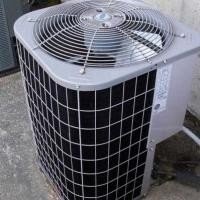
HVAC Design: The Importance of Properly Sized HVAC Equipment
Find Out Where YOUR Home is Losing Energy:
When buying any type of heating, air conditioning or geothermal system, it’s essential to select the correct unit to efficiently condition your home. Reputable HVAC contractors understand the importance of calculating the load requirements before recommending a particular system. These calculations include your building's size, the direction your home faces, the number and position of your windows, and any existing insulation. Avoid doing business with anyone who doesn't calculate sizing requirements: companies that fail to perform these calculations can't factor in a building's unique needs and characteristics, making it impossible to determine the best size for the HVAC equipment.
Some companies might choose to take the current size of your system, which won’t necessarily be the best size for your home. This approach doesn’t factor in any extra insulation that you may have added since the original heating or cooling system was installed. It also doesn’t consider that the existing equipment isn’t the proper size.
In the past, contractors weren’t required to perform calculations before applying for permits. Because of this, many buildings have improperly sized equipment, costing homeowners extra on their gas and electricity bills. When systems are not properly sized they cost more to operate, break down more often, and need to be replaced sooner – which all add up to additional costs.
Whether you’re looking to install new air conditioning equipment or replace the HVAC unit in your home, you deserve equipment that works at its optimum level. The Air Conditioning Contractors of America (ACCA) advises homeowners to, “make sure that your contractor uses the Manual J [HVAC design] residential load calculation procedure. Insist on it! Manual J is the official standard for residential load calculation and is required by many building codes around the country. It takes time and expertise to complete a professional load calculation and HVAC system design. Contractors lacking the necessary technical skills or who are just interested in making a ‘fast buck’ may try to convince you this is not important.”
Price shouldn't be your primary concern when hiring a contractor to install or service an HVAC system. In the long term, you'll save significant money by paying slightly more up front to hire an experienced, licensed professional who will correctly install the appropriate system for your home.
Benefits of HVAC Design Calculations
Correctly calculating your home's exact HVAC needs will benefit you in a range of ways:
- It determines the most efficient way to meet the air flow requirements of every room in the home. Each room has different flow requirements depending on the size and shape of the room.
- It ensures that you purchase an air conditioner that is designed and sized correctly. This helps avoid excess humidity, cool the whole home and help you save money on your electricity bills.
- You will spend less money in the long run, because your costs will be on the installation and not on repairs, downsizing or utility bills. Oversized or undersized equipment more frequently fails and needs costly maintenance.
- You won’t need to worry about one room being hotter or cooler than another. The size of your HVAC unit will be based on the shape and size of your home's different rooms, and your installation expert should be able to balance your unit's output.
- Effectively installed HVAC units run efficiently, using as little energy as possible, saving money and helping reduce pollution.
Incorrectly installed HVAC units will force you to:
- Spend more money heating or cooling your home.
- Replace your equipment sooner.
- Not be able to cool your whole home at the same rate.
- Not be able to dehumidify your entire home.
- Need expensive repairs on your equipment on a regular basis.
- Experience sudden changes in temperature in all or some areas of your house.
Having your HVAC design calculations performed by certified HVAC professionals is the key to energy savings, comfort and peace of mind. Learn more about how to choose an HVAC contractor.
Other HVAC solutions:
- HVAC Maintenance: Tips to Keep Your Equipment Running
- What is HVAC? HVAC is an acronym that stands for Heating, Ventilation and Air Conditioning.
- Who Invented Air Conditioning? Air conditioning is a modern convenience that we take for granted.
- How to Choose an HVAC Contractor This article will help you choose an HVAC Contractor.
- Superior HVAC Energy Efficiency By Upgrading Your HVAC System…And Other Fixes
- HVAC: What is it? The Basics Explained
- HVAC Design: The Importance of Properly Sized HVAC Equipment
- HVAC / Air Conditioning: A Quick Primer and History
- Sizing Up HVAC Prices: How to Choose the Right Air Conditioner
We were unaware of what was involved in an energy audit and your audior took the time to explain everything. We were impressed with the report which told us the areas in which we need to take action on. He never pressured us to use any particular contractors, he just suggested that we go to the Building Energy Pros web site to select contractors of our own choice. He did an excellent job and we HIGHLY recommend the Building Energy Pros. We already have recommended them to several of our neighbors. Again, EXCELLENT JOB!
Cynthia Simpson
The Building Energy Pros auditor was very knowledgeable. I was VERY HAPPY with him. He promptly E-mailed my energy audit report to me and I will consider all of his recommendations.
Tom McGee
We found out that our house really has no energy problems. We are happy to know that we
Leslie Stewart
I was very satisfied with your energy auditor. He was very qualified and spent a great deal of time with me. The energy audit was very informative.
P.B.
The energy auditor was very good and helpful. He keeps in touch with me to answer any of my questions.
D.G.
I was very satisfied with my energy audit. The auditor gave me some tips on attic insulation that were very helpful.
R.G.
I was very satisfied with my energy audit. Thank you!
R.S.
Very good service! I am going to replace the windows as the auditor had suggested.
D.W.
I was very happy with the energy audit. THANKS!
A. M.
My energy audit was very helpful. Joe Dempsey, your auditor, identified some structural problems that I was not aware of and explained to me why I need more insulation.
J. F.
The auditor was EXCELLENT! He spent ALOT of time with me. I am going to take 3 to 4 of his suggestions and correct these small items to save on my energy bills.
M. B.
The auditor did a GREAT JOB! He knew a lot about older homes, which we have. The report was very comprehensive. Thank you!
Vicki Nez/at
Your energy auditor was very nice and helpful. He answered all of our questions. We will recommend Building Energy Pros to our friends and neighbors.
Katherine McCaffrey
The auditor did a TERRIFIC JOB! The report was FANTASTIC! I will make all the repairs he suggested. I will definitely recommend him to everyone I know that could benefit from a home energy audit.
Steve Sleigh, Chevy Chase
The energy auditor was very professional and I am very satisfied with both the energy audit and the report I received. I will be referring the Building Energy Pros.
Tim Clary
I was very satisfied with the auditor. He was great and gave me some very valuable information. I will refer him to people I know who may need a home energy audit.
Willie Gantt
Your home energy audit proved to be very informative and helpful. I was not aware of the updraft created inside our walls because of the balloon framing construction. You said that that can cause heat to be pulled out of the house with the draft going up inside the walls and should be re-mediated. You also said that the attic insulation was insufficient and that fiberglass batts can leave spaces for around the edges causing heat loss and that it should have blown in insulation on top of what was there to seal the whole attic and increase the r factor. After going over your findings and telling me how you would fix the problems you told me how I could do it myself with stuff from the Home Center and for a quarter of the cost. Well, I did. I went into the basement and filled the bottom of the wall joist with unfaced insulation where they set on the sill plate. I then cut one inch foam board the size for each space and set it in and the sealed the edges of that with expanding foam as well as the sill plate to the foundation. I also sealed the sill plate to the foundation where the joist ran along it, as well as the top of those joist where it made contact with the subflooring. Next I went to the home center and rented their blown insulation machine and got ten bales of the insulation. I filled the attic on top of the batt insulation with about six inches giving another r-19 factor on top of the r-19 that was there. You said that the blown in would also help seal the heat loss around the edges of the batt. The work in the basement cost $144.00 and the work in the attic cost $328.00. After the 30% federal energy tax credit it will end up costing me about $330.00, which you said I should recover in savings in the first year. Thank You for all your advice and expertise. You made me aware of things I should consider and did.
Tommy Thompson


